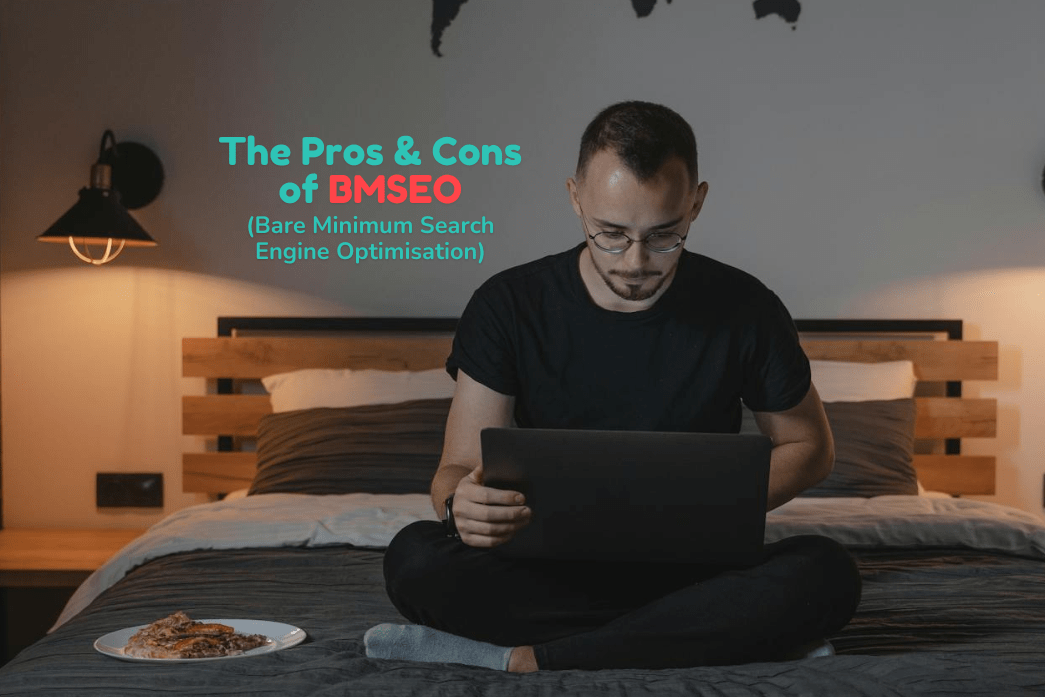
Most businesses and marketers now know about SEO. But many put just a few hours into it each month in a practice we’ve termed BMSEO (or BMO for short): Bare Minimum Search Engine Optimisation.
Is BMO a cost-effective way to secure quick rankings … or is it a waste of time? Let’s take a look.
What’s the difference between bare minimum SEO and the real thing?
| BMSEO | SEO |
| Doing a shallow keyword research using free tools or by manually searching | Using quality SEO tools to source high-potential keywords relevant to your topics |
| Adding keywords to your content in an ad hoc manner | Exploring search intent and analysing competitor content to distribute keywords effectively |
| Focusing on internal links or requesting free links from branded mentions | Developing a comprehensive link-building strategy with a focus on quality |
| Ignoring Technical SEO, except for maybe writing some alt text | Addressing the SEO issues in the backend of your site and monitoring them regularly |
| Aiming to write high-quality content | Demonstrating EEAT (Experience, Expertise, Authority & Trustworthiness) |
| Putting your marketing manager or content writer in charge of SEO | Hiring a specialist or using an SEO agency |
The Pros of BMSEO
You thought it was a trick, didn’t you? That there would only be cons.
Actually, we think that if you have a small business with the budget for BMSEO or no SEO, the bare minimum option is definitely worth doing.
- You’re not spending money you don’t have.
- You can achieve a level of success if the market isn’t too competitive.
- It’s an opportunity to train your internal staff in SEO.
The Cons of BMSEO
Of course, when you compare the bare minimum approach to a professional SEO strategy, many cons arise.
- You may be optimising for keywords that are too competitive.
- You won’t be able to respond fast enough to algorithm updates.
- Your domain authority score is likely to stagnate, as you’re not getting quality backlinks.
- It’s possible that search engines will either dismiss or not even index your content because of technical issues you haven’t picked up on e.g. coding, site speed, sitemap issues.
- As your results will be hit and miss, you’ll miss out on heaps of organic (free) traffic.
- Your ROI may dwindle, as it often takes a non-expert twice as long to do the same work as an SEO specialist.
- SEO will take longer to work. If your competitors are investing in SEO, your BMSEO might become irrelevant.
- You might end up with a lot of underperforming content on your site, which will signal to search engines that your site isn’t great.

The mistake many businesses make
Many businesses have the capacity to implement a full SEO strategy but choose to invest in short-term strategies like paid ads and influencer marketing.
It’s easy to think that a ‘bare minimum’ approach to SEO will provide enough organic visibility, especially if you’re a well-known brand name. But you may have fallen for one of two common SEO myths.
Common SEO Myth #1: It’s all about keywords
Actually, the relevancy of your content to the search intent, the EEAT you demonstrate, and the technical side of SEO matter a lot more to Google than they used to. Keyword usage is only one factor. If you ignore these other aspects, you won’t get very far.
SEO myth: More keywords = better rankings. Reality check: Quality content + smart SEO strategy = wins. #seo #digitalmarketing #Influencer #influencers #instagrammer #InfluencerMarketing
— Cheryl SEO Girl #SEO #DigitalMarketing (@SEOGirlCheryl) June 22, 2024
Common SEO Myth #2: It doesn’t get results
39% of purchasers are influenced by a relevant search (Think With Google). Today, it’s essential to rank on Google for target terms. That’s why 49% of marketers report that organic search has the best ROI of any marketing channel (Search Engine Journal). The problem? It takes time. But it’s worth waiting 3-6 months for your pages to climb up the rankings when that means free traffic to your site for a long time.
Finding the right approach for your business
A comprehensive SEO strategy looks different from business to business. But as a full-stack digital marketing agency, we typically recommend putting a decent portion of your marketing budget into organic search.
Once you’ve decided on a budget, you need to decide how to spend it. In the first few months of a new strategy, you need to do a lot of auditing and research. Then, find a balance between updating existing content, putting out new stuff, and building out a strong backlink profile that gives your website the strength to rank for more keywords and more competitive ones.
It’s often more cost-effective to work with an agency rather than hiring an SEO specialist. You’ll have experts at the top of their game providing targeted optimisations in the areas you most need them.
Book a chat with our team
Ready to transition from BMSEO to a comprehensive, cost-effective strategy? Our SEO team would love to chat with you about what this could look like.



